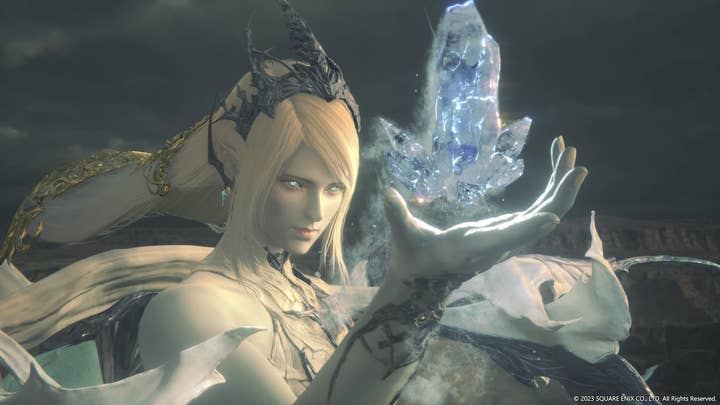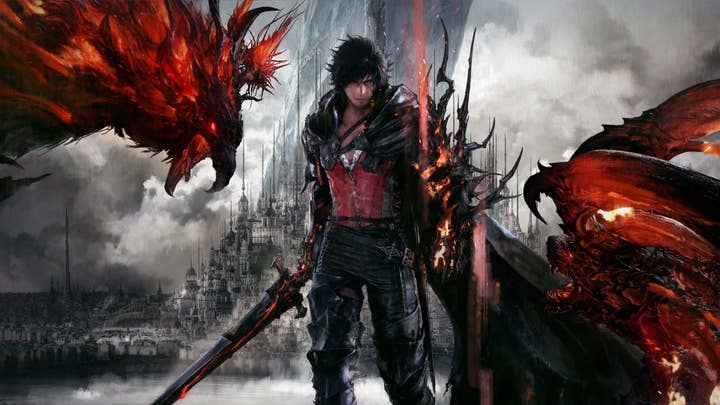FF16's demo is a masterclass in pre-launch marketing | Opinion
The choices that allowed the demo from Square Enix' latest to shine lie in the game's fundamental design
Sign up for the GI Daily here to get the biggest news straight to your inbox
It's rare to be able to watch public opinion about a game change in real time – and in the cases when we do, it's usually not a change for the better. Goodwill for a game (or for any other product or brand) is usually built up slowly but squandered quickly.
It's been refreshing, therefore, to watch the incredibly positive swing in opinion and word of mouth about Final Fantasy 16 this week, following the release of a demo for the game that has been an absolute coup for its marketing – answering the concerns of fans, giving acres of content to streamers and content creators, and intriguing newcomers to the series all at the same time.
It's not that FF16 is snatching victory from the jaws of defeat here – the latest instalment in the venerable series was already the subject of plenty of interest even before the demo arrived, partially because of its bombastic trailers that suggest quite a major departure from the mainline series, and partially because of the involvement of senior staffers from the very well-regarded FF14.
However, the tenor of that interest up to this point has been somewhat divided, if not a little confused.
Departing from the expectations of a long-running series not only in gameplay terms but also narratively and stylistically is a risk, and there are a lot of changed elements here that people feared might not quite add up to the sum of their parts. A severe misstep with any one of them could turn potential consumers off from pre-orders or day-one purchases.
Most devoted fans have had their pre-orders in for some time, I'd imagine, but in the next tier down in terms of dedication there were many people seemingly adopting a "wait and see" attitude to the game.
The demo released this week served as an incredibly effective riposte to any such concerns about the game. YouTube and other video platforms are full of creators playing and talking about the demo, and social media has filled up with positive responses – an incredibly positive and visible upswing in word of mouth, coming at a crucial moment just a week out from launch.
It's worth looking at exactly what Square Enix did here, and why it worked so well – because the FF16 demo isn't just reflective of a specific approach to using demos for marketing purposes, but also reflects a much more intrinsic and deeply held approach to designing the opening section of a game in a way that's properly attuned to the realities of gaming in the modern era.
Many other games could replicate exactly what Square Enix did with this demo and fail – so why has FF16's demo been such a rousing and attention-grabbing success?

Firstly, let's consider the questions the demo needed to answer.
FF16 has been overseen by core figures from the FF14 team (that's the online RPG, for those not keeping track – the one which has gone from strength to strength since being shut down and relaunched entirely a while after its original launch), but it departs from the Final Fantasy series' roots in a number of very obvious ways.
The combat shifts to Devil May Cry inspired action sequences, while its setting offers complex medieval fantasy storytelling in the mould of Game of Thrones, a long way from the series' recent settings and narrative approaches.
Even its approach to violence and "mature content" is a major step away from the well-established Final Fantasy model – and you can forgive some misgivings about that aspect, given that the previous attempt to make Final Fantasy "mature" was the laughably terrible Final Fantasy Origins last year.
Plenty of fans have wondered out loud how much they'll actually like this new, darker, more action-oriented and more 'adult' take on a Final Fantasy world, and even if few people seemed to outright feel that any of these elements will be bad, per se, there have been a lot of questions about who this game is for. The fear is that it might fall somewhat between two stools: being not quite Final Fantasy enough to satisfy core fans, while not being enough of a departure to overcome the disinterest of non-fans.
That's the climate in which the game's demo launched – and right from the outset, this is pretty much the Platonic ideal of what you'd want from a game demo. There's a very significant part of the game in there (about two hours of the opening section), setting up the story and characters and showcasing major elements of the combat and gameplay systems.
Moreover, since it's actually the opening act of the game, your progress in the demo can be carried over into the full game if you buy it, there's no need to replay this section. It's not a stripped-down version of the game's opening chapters; it's the whole thing, just as you'd play it if you buy the game next week.
Simply launching a good demo that lets people sink their teeth into the game for a couple of hours is a rare enough event, but the success of FF16's demo is far more deep-rooted than that
None of this should be unusual, and yet it is. Despite being in an era of technology where digital downloads are the norm and distributing demos should be easier than ever before, this style of demo is a relative rarity.
Sometimes that can be down to a game's publisher simply not having too much confidence that a demo will improve sales – if they're uncertain about the quality of the game, letting consumers try before they buy might be a commercial disaster. Oftentimes, however, it seems to be because of an odd instinct to ignore this classical style of demo in favour of "early access" or "beta access" programs.
Aside from being misleadingly named (they don't remotely serve to help to fund further development, as early access was meant to, nor are they testing any significant technical aspects, as beta programs should), these can exclude major parts of the game (it's common for "beta" programs to only include multiplayer elements, giving consumers no way to try single player aspects of the game) and may not carry over progress into the final product.
Worst of all, these are often only available to consumers who have pre-ordered expensive Deluxe versions of the game – the precise opposite of the try-before-you-buy concept that demos have traditionally embodied.
Simply launching a good, competent demo that lets people genuinely sink their teeth into the game for a couple of hours is a rare enough event, then – but the success of FF16's demo is far more deep-rooted than that.
This style of demo is less of a departure for Square Enix than for most other publishers, as they've been keen on releasing demos for a while now – rather, what is interesting is how well-structured FF16 is to provide a compelling demo experience. There are many games for which simply carving out a two-hour slice of the game's opening section as a demo would be disastrous, because very weak opening sections are pretty common in video games.
Often, the first couple of hours of a game will give players few abilities to use, while meandering through backstory or introductory material without really giving the story an inciting incident or properly building up characters. Much of the actually appealing content is often locked up until much later in the game. How often have we talked in terms of a game "getting good after the first few hours"? Giving players those first few hours, before the game gets good, as their try-before-you-buy experience would clearly be self-defeating.
This is an approach to design that is anathema in most creative industries – successful creators in most mediums have a very clear idea of how little time they have to hook someone before they get bored and do something else instead.
It has survived in games because of the assumption that players have paid their $60 or $70, and will therefore keep plugging away until things get interesting. That notion doesn't just make it hard to make a compelling demo. It's also dangerously outdated, and potentially disastrous in an age when more and more potential consumers will have downloaded your game for free through a subscription service.
The upshot has been a marked uptick in positivity around the game; forums and social media are full of consumers talking about their decision to buy the game being sealed by the demo
An increasing proportion of your players will lose nothing more than a bit of download time if they get bored and delete it within the first 30 minutes – so the question of what you're showing them and what you're letting them do in that first 30 minutes becomes absolutely crucial.
FF16, judging from its demo, is a game that fully understands that paradigm. It launches into the action in media res, and fills its opening two hours with interesting, exciting aspects both narratively and in gameplay terms, such that finishing the demo will likely leave most players very keen to see what happens next.
It's a Final Fantasy game, so we can assume there'll be plenty of stuff to do to fill your time, with a world full of side quests and collectibles, probably an interminably dull fishing mini-game, almost certainly an unfathomable card game – but the game wisely decides that you can find and engage with all of that later on, leaving the opening sections to clearly lay out the headline elements that will pull people in.
The format owes much to the idea of a pilot episode of a premium TV show, and it will stand FF16 in good stead not just in releasing this demo, but also down the line when the game inevitably becomes available on streaming and subscription services.
The upshot has been a marked uptick in positivity around the game; forums and social media are full of consumers talking about their decision to buy the game being sealed by the demo, and recommending it to those on the fence. It's a remarkable accomplishment for the game's word-of-mouth marketing, and should hammer home the point that thinking about how a game will actually be experienced and consumed – whether it's in pre-launch demos, over a streaming service, or through a subscription system – needs to be something that happens from the earliest point in the design process.
FF16 was clearly designed from the outset with the reality of modern game distribution and experiences in mind; its sales figures next week should show the benefit of that decision.
Sign up for the GI Daily here to get the biggest news straight to your inbox










